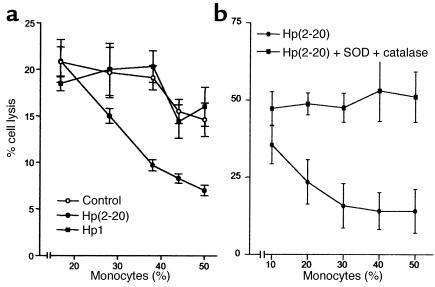Figure 4.
Monocyte-dependent inhibition of NK cell cytotoxicity by Hp(2–20) (50 μM), reversal by oxygen radical scavengers. NK cell–enriched lymphocytes (105 cells/well) were incubated with autologous monocytes for 16 hours at 37°C and assayed for cytotoxicity against 51Cr-labeled K562 cells (104 cells/well). (a) The cell cultures were treated with culture medium (control, open circles), Hp(2–20) (filled circles), or the control peptide Hp1 (50 μM) (filled boxes). Results are percentage of cell lysis (mean ± SEM of quadruplicates). Hp(2–20) did not significantly affect cytotoxicity in the absence of monocytes (not shown) but enhanced the monocyte-induced inhibition of cytotoxicity at all monocyte/lymphocyte ratios investigated (a). The monocyte-dependent inhibition of NK cell cytotoxicity by Hp(2–20) was confirmed in ten experiments using blood from different donors. In these experiments, the Hp(2–20)–induced inhibition was statistically significant over that induced by control monocytes at 37% monocytes (P < 0.005; Wilcoxon’s rank sum test) and 44% monocytes (P < 0.005). (b) The cell cultures were treated with Hp(2–20) (filled circles) or Hp(2–20) + SOD (50 U/ml) + catalase (200 U/ml) (filled boxes). Results are percentage of cell lysis (mean ± SEM results from eight experiments using blood from different donors). At all monocyte/lymphocyte ratios above 1:5 monocytes, SOD + catalase significantly rescued NK cell cytotoxicity from Hp(2–20)–induced inhibition (P < 0.01–0.001, Wilcoxon’s rank sum test for pairs).

